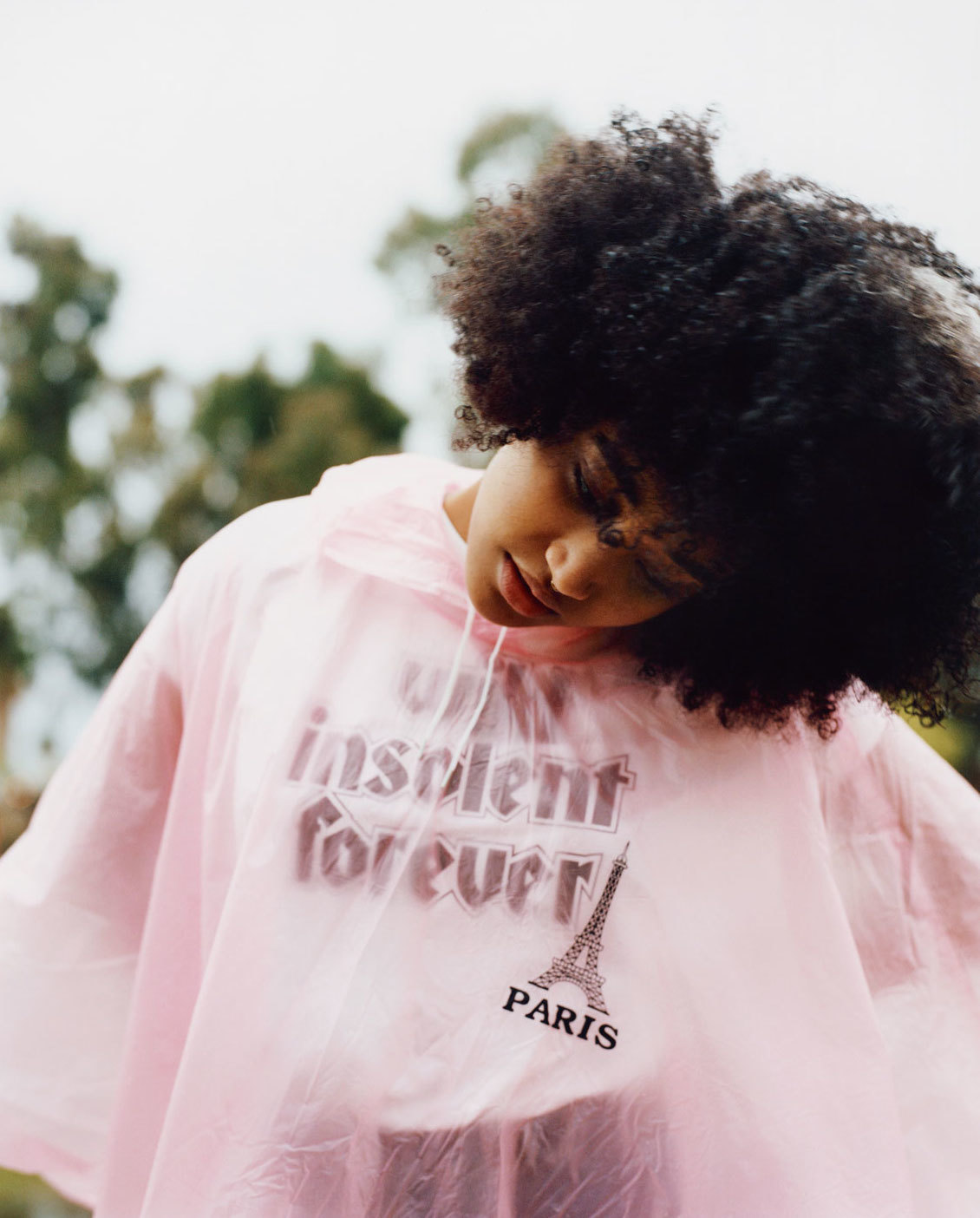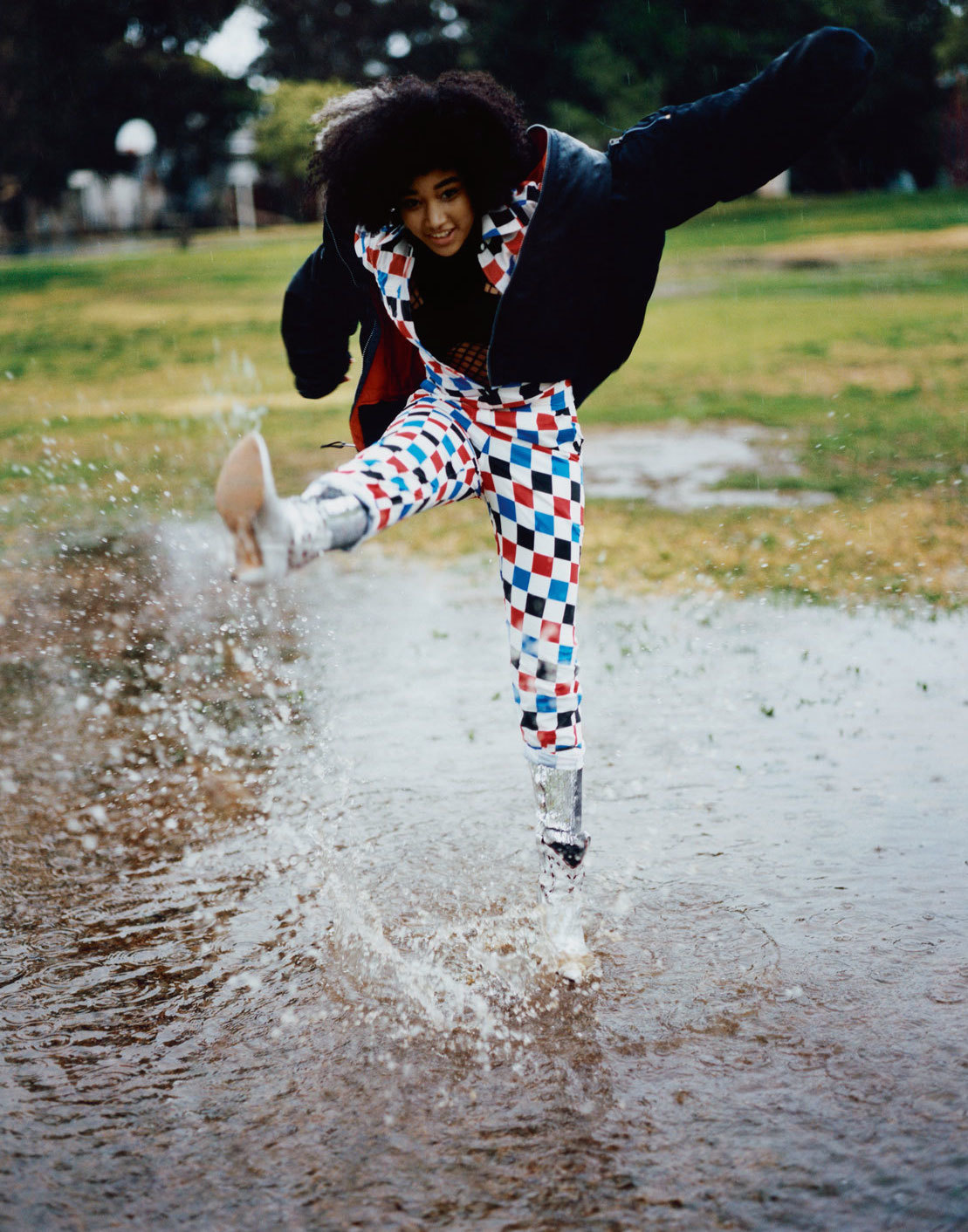
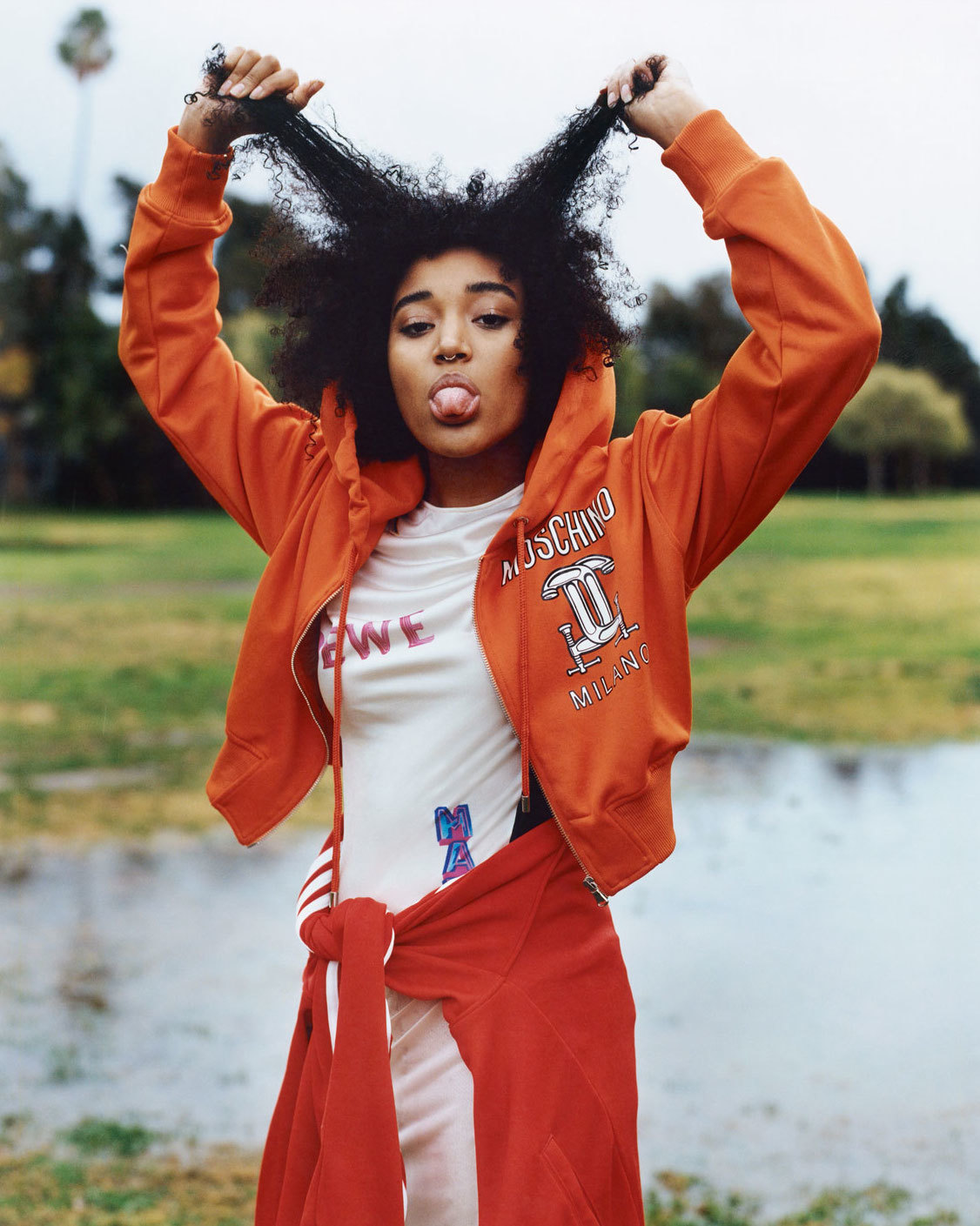
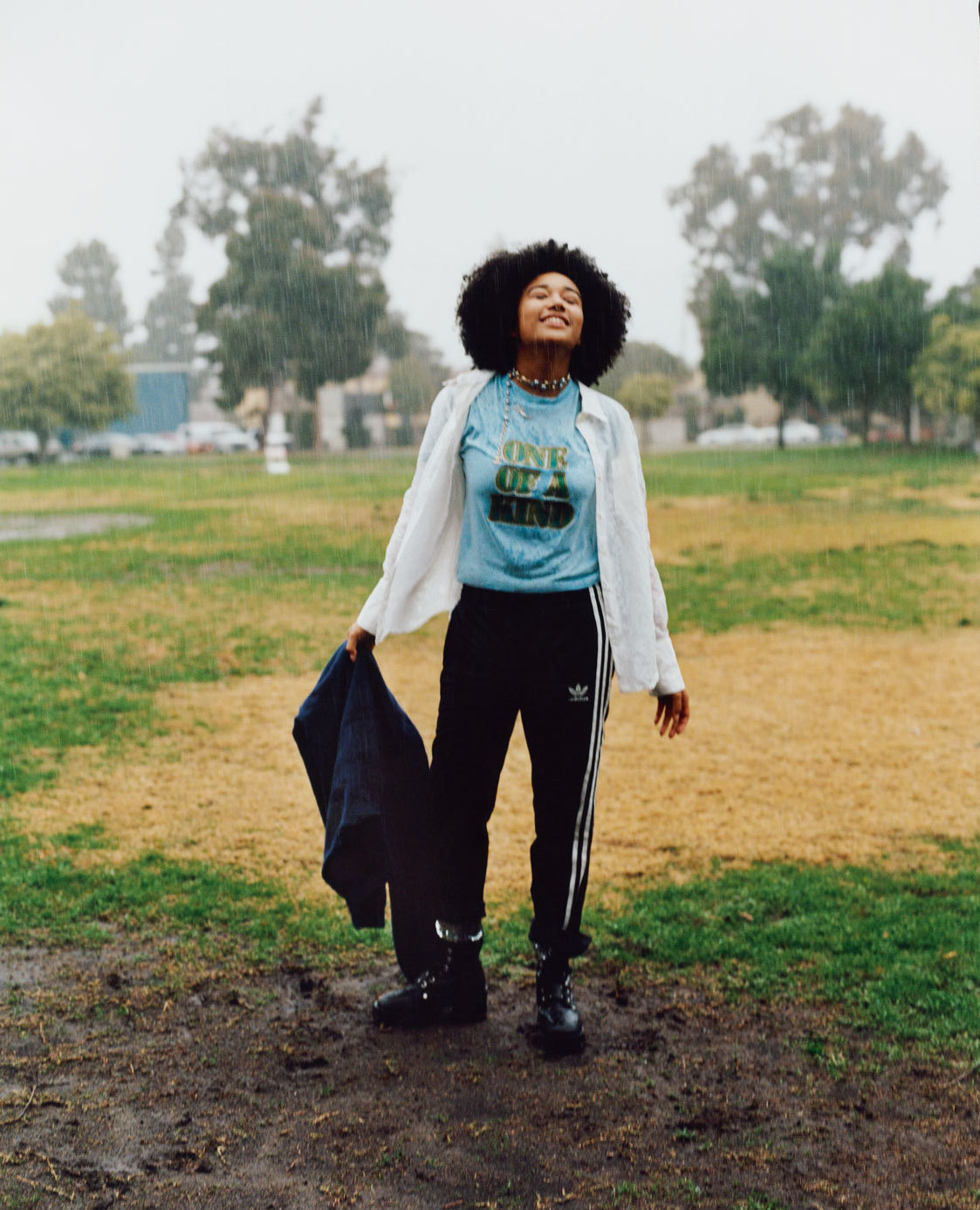
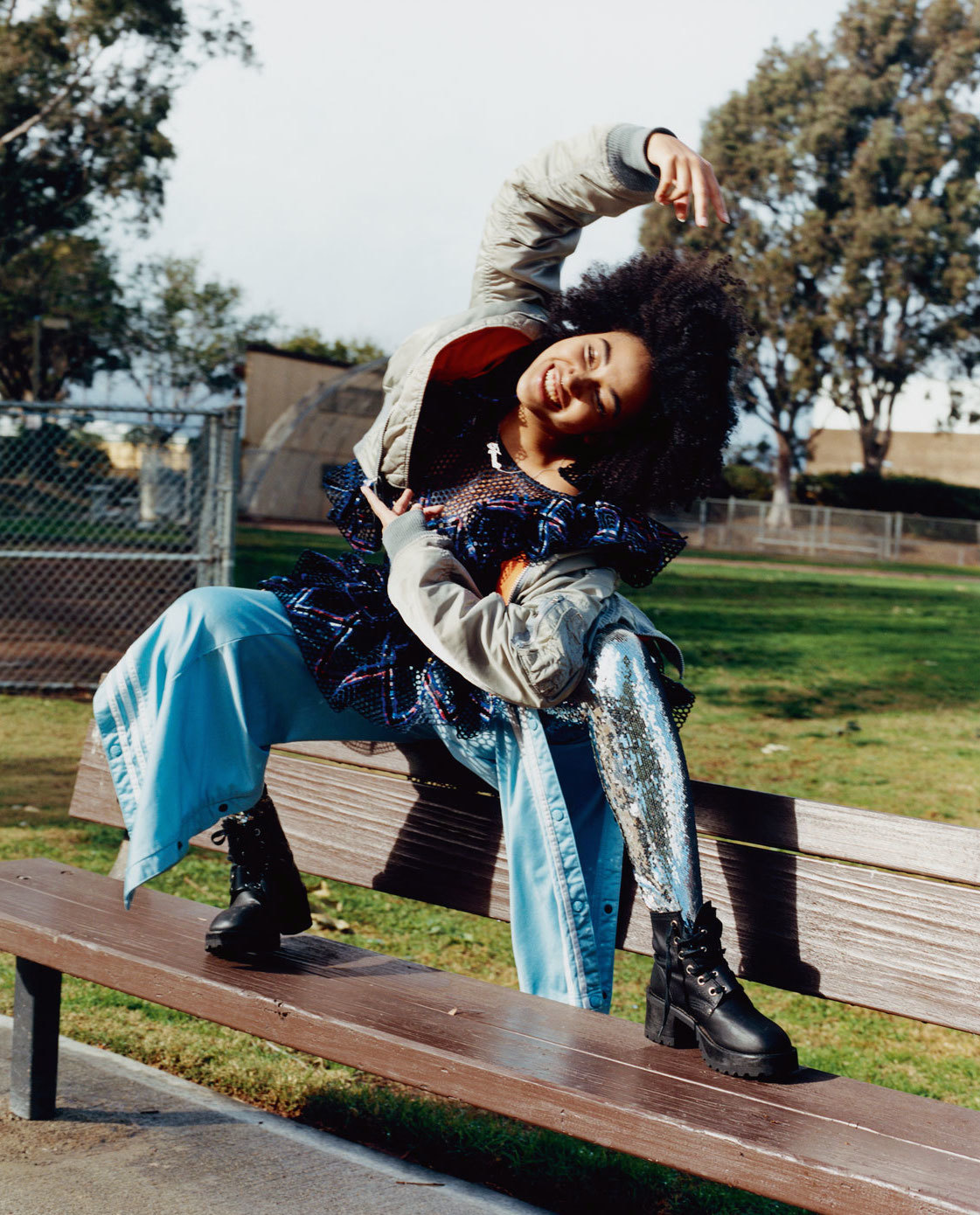
Google Amandla Stenberg, and what comes up? Her now famous Don’t Cash Crop My Cornrows video made for a school history class, discussing the blurry lines between cultural appropriation and cultural appreciation. Her Instagram and Twitter pages clocking in at nearly 600,000 and 300,000 followers respectively, and a wealth of articles, interviews, and opinion pieces rightly describing the teen star as “influential,” “trailblazing,” and “radical.” “Sometimes those words do feel kind of daunting,” Amandla tells i-D over the phone from LA. “I feel like I have so much to prove and live up to. I have this reputation that I have to maintain and sometimes that feels like a lot of pressure.”
Speaking to Amandla, you’d be forgiven for mistaking her for someone twice her age. She’s wise far beyond her 17 years, firm, and self-assured. She has the sort of staunch self-belief and unshakeable confidence that comes with age, without losing the hopefulness and innocence attributed with being young.
Amandla was born in Leimert Park, a residential neighborhood just south of Los Angeles, to a Danish father and African-American mother. She grew up idolizing pop stars like Destiny’s Child, Ciara, Gwen Stefani, and Alicia Keys. “I also went through a Green Day phase… unfortunately,” she says. “I was figuring out who I was as a black kid, then I started going to school on the Westside, which was predominantly Caucasian, so there was always this interesting conundrum of figuring out the different parts of my identity that existed in different places. In school all the kids were white and at home all my friends were black; it’s a duality a lot of bi-racial kids deal with.” In her formative years, Amandla struggled with how to self-identify, her feelings muddied by those around her keen to label her with inaccurate stereotypes. “There were all these occurrences in my identity of being too black in some spaces and too white in others,” she explains. “Not that there is such a thing as too black or too white, but that is a feeling I had growing up.”
Amandla remembers the first time she knew she was black and, in turn, different to her Westside friends. “I was playing hide and seek when I heard a boy go, ‘Where is that little black girl?’ And I was like, ‘Oh… that’s me!’ It was the first time I recognized the concept of race applying to my life.” Amandla’s first bitter taste of racism came publicly. Appearing in commercials and catalogues since she was a child, Amandla enjoyed a small role as a young Cataleya in 2011’s Colombiana, before her big break came at the age of 12 when she was cast as Rue in the first installment of The Hunger Games, the film adaptation of the fantasy novels by Suzanne Collins. “I remember being so excited because I read the book and Rue was black,’ Amandla says. “I was exhilarated about that because it’s so hard to find roles and characters for little black girls that they can identify with. Then I saw things on the internet about how my death [in the movie] wouldn’t be sad anymore and that was kind of shocking to me. It wasn’t so much hurtful, as it was confusing. I couldn’t really wrap my head around it.”
Afterwards, Amandla grappled with how to present herself. “I went through a period when I totally rejected the black side of myself,” she confesses. I straightened my hair and tried to make myself more digestible, but recently I have realized that the black component of my identity is extremely, extremely important. It has completely changed who I am as a human being. I feel like now my identity has gone full circle.”
Amandla’s unwavering support for minorities has catapulted her into the spotlight. The aforementioned Don’t Cash Crop My Cornrows, in which she discusses everything from the history of black hair and its affirmation of the black identity to the adoption of hip-hop culture by a mainstream audience and its meaning, has clocked up almost 1.9 million views on YouTube. And today she regularly uses her social media channels to promote her own brand of online activism, commenting on social issues such as sexuality and gender roles and cultural prejudices, from the angry black girl narrative to police brutality. She’s been named one of the world’s most influential teens by TIME magazine, a feminist of the year by the Ms. Foundation for Women and, together with her friends we know (Tavi Gevinson, Willow Smith, and Kiernan Shipka) and those we don’t (check her Instagram, they feature frequently), she is leading the charge of young female talents who are taking on social issues close to their hearts and speaking out. Even in the midst of the pressure of her growing profile and negativity from online trolls, Amandla’s friends are her support system. “My friends have been so essential to my process of discovery and growth and I am lucky to have them,” she says. “They are great people who are so comfortable in their own identity that they can assist me in finding mine. I would love to work with a lot of my friends. Zendaya, Yara Shahidi from Black-ish, and Willow too. I think it would be so cool if we could all be in one movie together and form a #blackgirlmagic squad. It would be really awesome!”
In the midst of spearheading a movement, Amandla is moving forward with her acting. She stars alongside Owen Campbell and Charlie Heaton in As You Are, a coming-of-age indie film directed by Miles Joris-Peyrafitte which premiered at this year’s Sundance. The film follows three teenagers in the 90s as they — in Amandla’s own words — “find themselves, explore their sexuality and fall in love.” She has also created her own comic entitled Niobe, born of her love of fantasy and science fiction. “I’m a huge Studio Ghibli fan!” she says. “My phone case is actually a Spirited Away case. I wanted to create something similar, that captures that feeling, but features someone who is black and female because I feel those roles really exist in fantasy the way I wish they did. So I decided to start something myself.” When asked about the changes she wants to see in the world, Amandla says, “I want to see representation for people of color and queer people, people who aren’t able to dominate the media in the way that they should. Just look at the recent Oscar nominations,” she goes on, “I want the younger generation to know all of this! We really have to focus on the concept that other people don’t make you who you are as a human being — your decisions and what you contribute to the world is what is most important.”
Amandla gives a voice to those who don’t have one, those who are disenfranchised — and uses her platform to talk for them. “If me having the platform and me going through this process of self-discovery is helpful to other people who are struggling to assert themselves then that’s incredible,” she says, “and of course I want to continue doing that. I feel like it has happened by accident though, I would never have expected people to respond to me just being myself with so much interest, so much compassion and sometimes so much hate.”
Despite the unjust prejudices she’s faced and a volatile 2015 for the black, transgender, queer, and disabled communities she holds so dear, Amandla remains optimistic for the future. “The best thing about being young? The endless possibilities. I have no idea what is in store the rest of my life and that is exhilarating to me. I am very young and have a lot to learn and I am also going to mess up and that’s okay. I am just going to continue doing me because that’s the only thing I can do.”
Credits
Text Lynette Nylander
Photography Oliver Hadlee Pearch
Styling Emilie Kareh
Hair and makeup John McKay at Frank Reps using Shu Uemura
Photography assistance Gregory Brouillette
Styling assistance Fiona Godivier
